Today, enjoy the Empire newsletter on Blockworks.co. Tomorrow, get the news delivered directly to your inbox. Subscribe to the Empire newsletter.
Ready, set, go!
“I think we’re in a new cycle,” PitchBook’s Robert Le told me.
“In the last six months to maybe even a year we’ve been in the same cycle in terms of sentiment, increasing capital going into the space, and more developers coming and building. So last quarter, I think, maybe there was a little bit of a lull,” he added.
Le’s feeling pretty positive about the fall, and he thinks it’s just a matter of time until projects start announcing more token launches. He’s already seen plans for the third and fourth quarters of this year, but there’s currently a “prisoner’s dilemma” where folks are trying to suss “how the market is going to move,” to time it just right.
The fourth quarter of last year into the first quarter of this year saw a decent chunk of token launches. but it’s since dried up. Even token unlocks aren’t bountiful, according to data from the Tie Terminal.
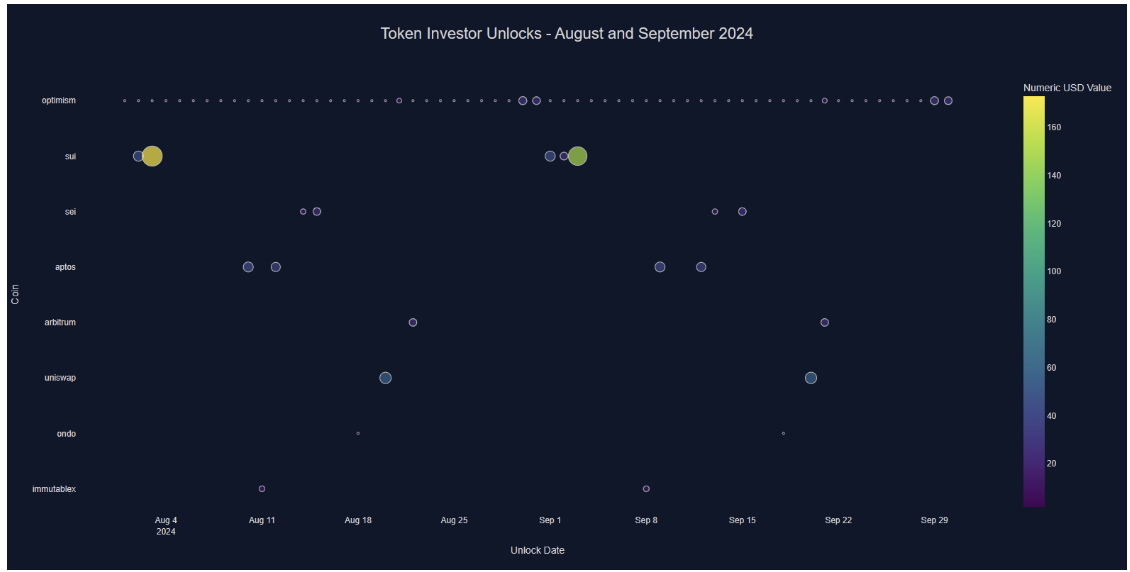
The unlocking of $350 million worth of SUI is the biggest unlock over the last month into September, as shown above.
Le’s not the only one feeling more positive. Ledn’s John Glover previously said that he also thinks sentiment will sort itself out now that the summer’s coming to an end.
The election, Le believes, won’t impact crypto.
He likened crypto to being an “abused child” in search of love, and a candidate like Trump is the first one to give the industry such attention.
In the end though, “governments don’t like crypto because it’s trying to supplant the traditional financial ecosystem or financial system. It won’t necessarily matter if one party over another supports crypto, Le said. In the end, he believes the industry is better off working with “both sides” — whoever is in the White House — and the regulators.
Had Trump been in office post-FTX, his administration would have had to crack down on the industry just as hard as the Biden administration and SEC’s Gary Gensler have, he added.
Speaking of 2022, we’re not anywhere near the venture capital activity that we saw back then, though things are looking up in comparison to last year.
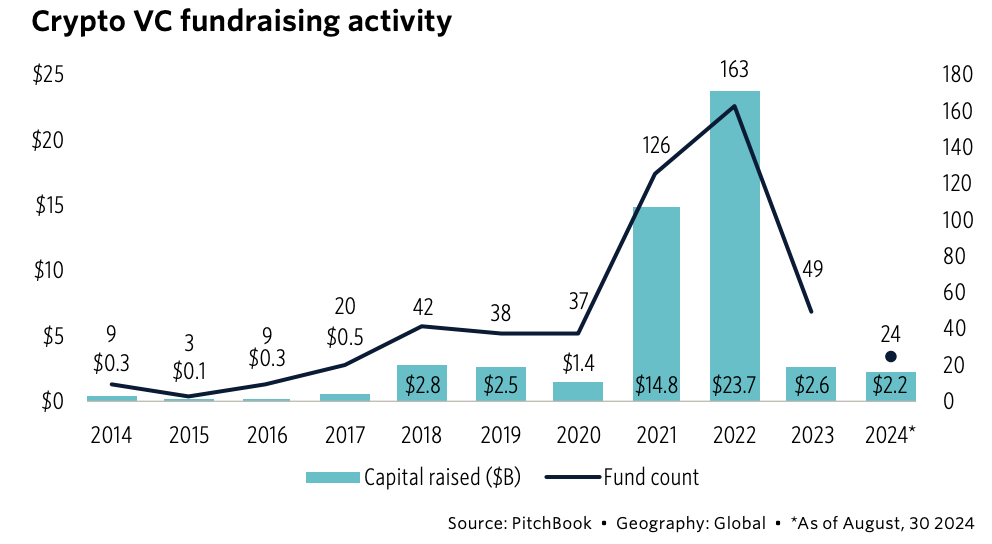
Per Tie Terminal data, last month saw 167 raises totaling $981 million. DeFi projects led the charge, raising $210 million. And the data shows that gaming and metaverse segments are showing an uptick in activity, with $65 million raised last month.
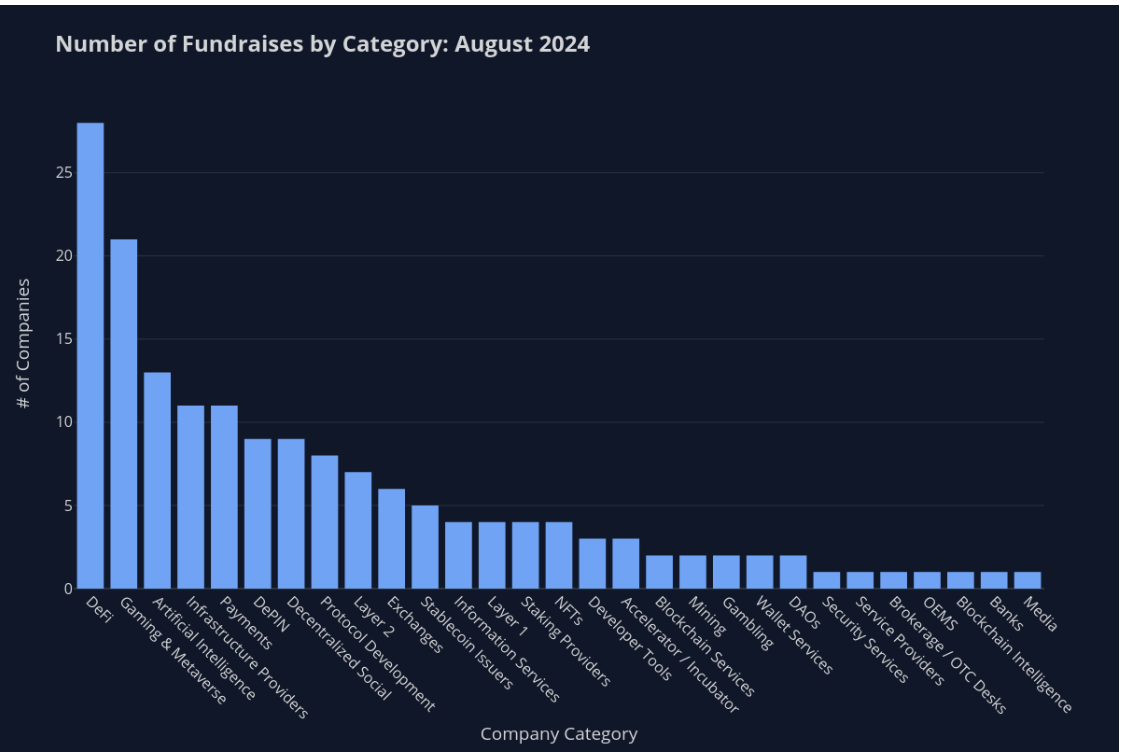
In a report released Friday, Le noted that the median fund size has jumped 76% to $41 million from $25 million last year, with a lot of those being midsized funds (we’re talking $100 million to $500 million).
This shows that “these funds may represent a sweet spot for crypto investors — big enough to support a growing industry but not so large as to struggle with finding viable opportunities. In an industry still in its relative infancy, $1 billion funds face the challenge of needing to write checks worth $25 million to $50 million, which forces them into high valuations and larger bets in a market where startups of that scale are still scarce,” Le wrote.
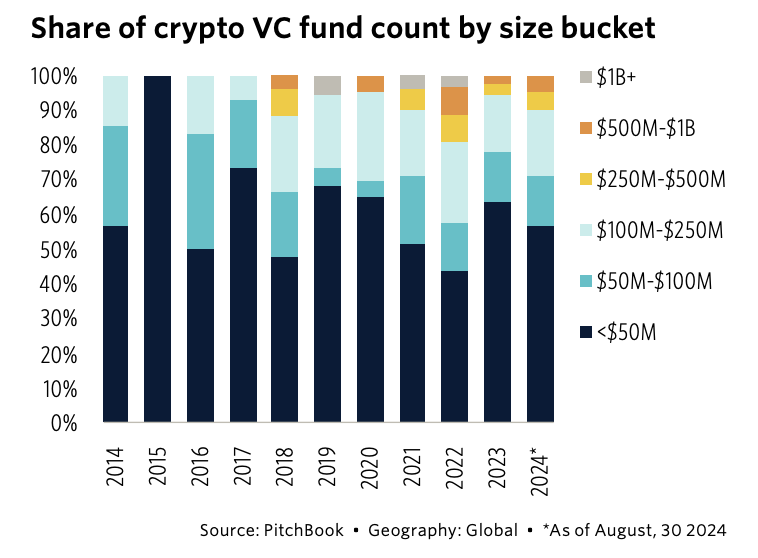
Staying below 2022 levels may actually be a good thing, given that hype isn’t necessarily always a long-lasting thing.
Le said he feels “pretty good” about a full-swing bull market “sometime next year,” now that we’re starting to see more signals and can drown out some of the noise.
— Katherine Ross
Data Center
- BTC and ETH are working on recoveries after bottoming on Friday. BTC is up 3.6% since hitting a monthly low of $53,300, ETH is up 5.7% after reaching $2,190.
- SUI leads the front page over the week with 19%, having risen from $0.78 to almost $0.93. SUI’s still down 57% from its all-time high in March.
- Hyperliquidhas pulled ahead of Arbitrum, Solana and Ethereum for weekly DEX perps volume, now $6.57 billion and over 22% of the total.
- Fewer than 700 memecoins were launched yesterday on Tron launchpad SunPump, down from over 7,500 at its peak at the end of August.
- Almost 4,600 memecoins were launched on Solana’s pump.fun yesterday, down from more than 20,000 in one day last month.
Friend technology
So much of crypto relies on capturing lightning in a bottle — and monetizing it.
Friend.tech did manage to pull off the former. The platform had riffed on what BitClout had tried during the height of the 2021 bull market: letting content creators and other personalities tokenize shares of their social media profiles so that their followers can gain exposure to their trajectories.
Where BitClout had launched its own blockchain alongside a token sale, Friend.tech opted to deploy on Base without a native token.
At the time it was considered a key advantage, considering how sharply BitClout’s CLOUT token had dropped after its exchange listings.
And for a few months in 2023 leading up to the start of the bitcoin bull run, Friend.tech seemed to find traction — generating hundreds of thousands of dollars in protocol revenue every day.
But a botched airdrop came months after activity peaked. Friend.tech users had trouble claiming their tokens, while reports indicated that some of the biggest airdrop farmers were dumping quickly after receiving their allocations.
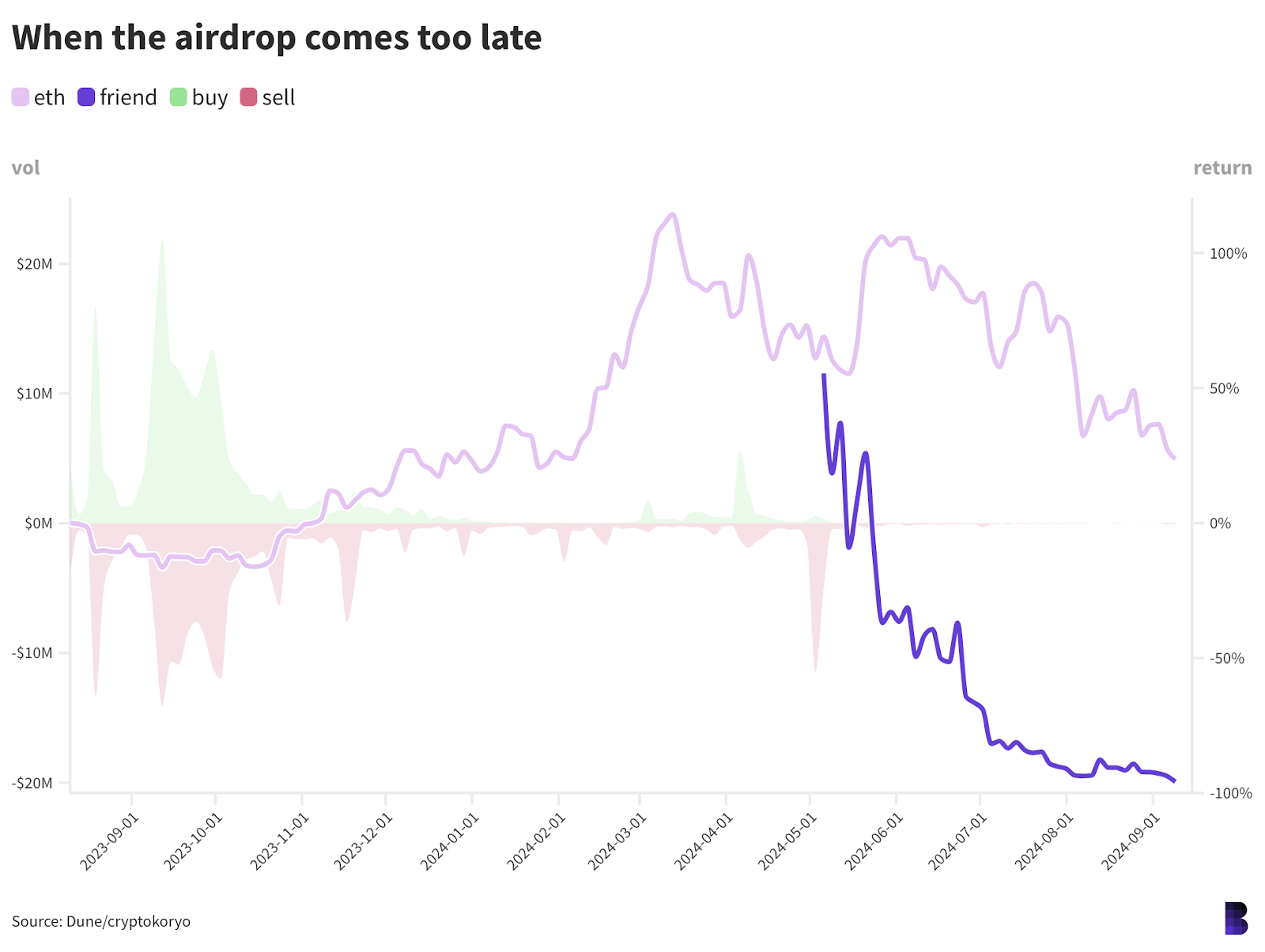
In total, Friend.tech generated 17,280 ETH in protocol fees, valued at $22.3 million at the time of earning those coins, or $40 million today. But as you can see on the chart above, most of the revenue was made long before the airdrop, which happened at the start of the blue line.
The FRIEND airdrop also came only this May, around six weeks after bitcoin hit its all-time high. Crypto markets have been generally sliding ever since, giving little cover for a sudden resurgence in interest in Friend.tech and its token.
Friend.tech isn’t completely dead per se. Its developers have only renounced the keys to the smart contract, meaning there’s no longer any access to the backend, so no more updates. The front end is still alive and Friend.tech’s X account has said it will continue operating.
All told, the protocol quickly made millions, but that didn’t convert to staying power. Although, that’s so far been tough for social coins and Web3 social apps, particularly ones that revolve around the hyper-financialization of our online personas.
Something tells me more platforms will take runs at it — hopefully with better timing and a smoother airdrop.
— David Canellis
The Works
- $1.2 billion was pulled from bitcoin ETFs over a span of eight days through Sept. 6, Bloomberg reported.
- Bernstein analysts think bitcoin could top $90,000 if Trump is elected, though they think it could fall if Harris is elected.
- Coinbase’s Paul Grewal said a judge ordered the SEC to turn over some documents in the agency’s case against the exchange.
- Prosecutors in Ryan Salame’s case reaffirmed to the judge that they never went back on the original deal struck with Salame when they continued to investigate his partner, Michelle Bond.
- Last week, the CFTC sought an emergency stay of a judge’s decision to strike down an order prohibiting prediction marketplace Kalshi from opening US election betting for US users.
The Riff
Q: Can there be more to crypto than bull and bear markets?
Let’s flip the question: Is there more to Amazon than its share price?
Most people would likely say yes. They probably order stuff from Amazon regularly or read ebooks on a Kindle.
It would be more difficult to believe that most would say the same about bitcoin, ether or even solana. I’ve even made the case previously that the sole reason that any of us are here is because of prices — as even the most technologically focused use cases are only viable if prices aren’t too low.
To be clear, I am a huge proponent of decentralized blockchain protocols and peer-to-peer sound money.
And obviously, higher prices would amplify their power. Or at the very minimum, they would allow many of the current applications in the space to turn profitable, particularly after factoring in the dilution of token holders through incentive payouts.
The viability of much of the crypto space is unfortunately tied to bull and bear markets. But once protocols and other projects have mastered the art of sustainability, prices will matter much less than they do right now.
— David Canellis
I touched very briefly on signal vs. noise, but this is kind of what I’m trying to get at in conversations with folks at the moment.
Obviously, sentiment is really important. But at a certain point, we do have to step back and look at the data, to figure out whether there’s a true reason for negative sentiment and therefore poor price action — or if folks are just tired.
Remember when we riffed on checking prices? People burn out when they focus too much on one thing.
We’re all here because we believe in what crypto can do. Not what the price of bitcoin, ether, or a token can do. Separate signal from noise, and start tuning that noise out.
Don’t get me wrong, bull markets and bear markets will always be there — and will either drive or hinder innovation — but we can still buckle down and focus on building.
— Katherine Ross
 blockworks.co
blockworks.co